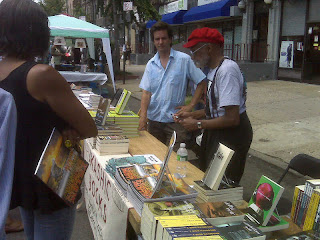Serenity
is key. When I’m sitting on that stone bench
beneath the morning glories, nothing stresses me out.
My dog’s red fur glows like heated copper in the moonlight.He’s a buff metalsmith protecting me from worldly harm.
He wears a shredded shirt, and beads of sweat dangle off the tips
of his red-orange beard as he pounds on his anvil.
He has a sword tattooed on his upper arm. He’s the perfect bodyguard,
the kind of man who will linger in the background and
jump out with a machete if anything sketchy happens
to me. My dog is the best.
Planting a moon garden isn’t difficult. I started
when my dog was a puppy and kept me up all
night. I needed to occupy myself during the wee
hours. Before I got my dog, I didn’t sleep well either
because in silence my mind takes over. I think too
much. Planting datura and nicotiana seemed like the
answer. Thus, I dig and weed in my pajamas. When
I’m exhausted and dirty from gardening, I can get
some rest. Commitment to the plants is the closest
I’ve come to putting down roots. It’s like we’re married
because they depend on me.
“Your garden looks good,” my neighbor calls over
the fence. I’m gardening and the moon’s coming
up.
Not just good, lady, magical, I think.
Dalton's sensibility leans hard into the mystical, the wildly imaginative. The book in its entirety captures you inside its projected world. From "Animal Party:"I moved to the desert to escape the noise and crap
in Los Angeles. L.A.’s air felt gunky on my skin. Just
walking outside I’d acquire greasy layers. I washed
my face three or four times a day. Four hounds next
door started barking at dawn every morning. The
city felt claustrophobic and dingy, even at night
when I was most alive. I couldn’t see stars. I’d sit at
my desk spying through binoculars into other people’s
houses. Even then, I only saw TVs flickering—
no naked woman dancing, no stoner getting high.
Everyone was so boring. Worst of all, I hated driving
the grids; it made me feel stupid, like a termite. All
the daily plugging away in the car, on the phone,
on the computer, in the kitchen, shopping, getting
dressed, talking, thinking, behaving, and controlling
amounted to nothing more than survival, something
that a termite does so easily with no financial security
or brains.
It wasn’t fair: all the responsibilities, all the years
of moral preparation and schooling, for no more
accomplishment (a rented house, decent meals) than
that of an insect. You think humans are superior, but
they’re really not—think of all the amazing feats termites
can pull off that we can’t: chewing and digesting
wood, carrying things hundreds of times their
weight, building massive muddy towers and secure
tunnel systems, communicating telepathically without
language. Being human is a gyp.
WIDE EYED is filled with this kind of lyrical wandering.
Between stories Trinie Dalton gives a delicious glimpse (think
of the amazement of looking through a viewfinder) into a mind,
her mind. In "Beinvenido El Duende," we get something like a
manifesto:
Here’s why I wish
fantasies could become reality: because they’re so
much more interesting. Manticores and mermaids
are more appealing than goldfish and rats. In daily
life, even if you see something you’ve never seen
before, it can’t beat a minotaur shooting arrows
into a mushroom cloud. I wish an army of skeletons
would swordfight me like they did Jason in Jason and
the Argonauts. What would be the most surprising
thing that could happen to me today? A spider biting
me? Big deal.
More information about WIDE EYED can be found here.
Trinie Dalton lives in Los Angeles and has an MFA from Bennington Writing Seminars. Dear New Girl or Whatever Your Name Is, an artbook she coedited, is available from McSweeney's.
She is the editor of the art book MYTHTYM, and author of A Unicorn is Born. 






